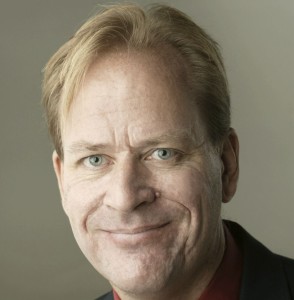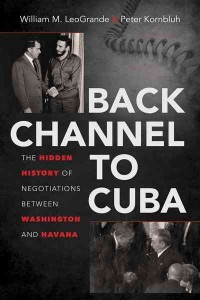
A guy from TV Martí walks into a bar…
Stop us if you’ve heard this one.
A civil servant from TV Martí walks into a bar, orders 12 shots, and starts drinking them as fast as he can.
The bartender interrupts him to ask, “Why on Earth are you drinking so fast?”
The guy says, “You’d be drinking fast, too, if you had what I have.”
The bartender asks, “What do you have?”
The Martí man replies, “75 cents.”
Okay, that was a joke.

But, when Tracey Eaton reported earlier this week that our government is spending “U.S. tax dollars for parodies of Cuban politicians,” he was dead serious.
Tracey’s item pointed to a solicitation from the Broadcasting Board of Governors posted on an e-government website at the end of August. This agency is home to Voice of America and, importantly for our story, the Office of Cuba Broadcasting – or OCB – which operates Radio and TV Martí.
Under the memorable title “OCBSatire,” the Office of Cuba Broadcasting announced that it has “a requirement for exclusive, non-transferrable rights for a Cuban satirical variety and comedy sketch show for inclusion in its programming.”
You will be forgiven for assuming the word “requirement” indicates a desire on OCB’s part to spice up its dry reporting about Cuba.
Instead, the requirements are really, well, requirements that the businesses submitting proposals must observe to have their shows picked in exchange for an unspecified amount of money.
This solicitation, as if spelling out a detailed regulation to control air pollution, is quite granular. The OCB wants scripts for ten shows. Scripts must be thirty minutes in length. “Each skit should ideally be comprised of 3 segments with accompanying commercial breaks followed by a formal close.”
OCB is not looking for just any kind of comedy to entertain its Cuban audience.
“These skits must be able to parody public figures, politicians, government officials, entertainers, as well as recognizable members of Cuban civil society groups who are active in the political and civil sphere and widely known throughout the Island.”
Of course, no U.S. government contract to secure sketch comedies to promote American-style free speech in Cuba would be complete without provisions giving the Office of Cuba Broadcasting the right to prescreen and censor the content as it sees fit. Really.
But, here’s the best requirement. “These parodies must be uniquely funny, ironic, satirical and entertaining to a wide cross-section of the Cuban population.”
 The U.S. government is going to decide that? Earlier this week, we wrote the contracting officers at the BBG and asked “who will determine which proposal is selected?” We never heard back.
The U.S. government is going to decide that? Earlier this week, we wrote the contracting officers at the BBG and asked “who will determine which proposal is selected?” We never heard back.
If the BBG lacks in-house capacity to decide what’s “uniquely funny,” maybe they’ll get advice from the team that put up a prime time comedy show on Radio Martí that featured a cast whose actors were mostly dead, as The New York Times reported in 1985, by the time the program aired. Or maybe they’ll get help from the producers of “The Chief’s Office,” described by the Associated Press as “a satire on the life behind the scenes in the fictional office of a military leader with an extraordinary resemblance to Fidel Castro.”
No need to sound “spoiler alert” before saying these previous attempts at satire – not to mention other not-so-hilarious episodes featuring an invasion, acts of terror, exploding cigars and poison-secreting wet suits – have been completely ineffective at upending Cuba’s government.
As bad as this all sounds, our complaints about OCBSatire go deeper.
First, if the contract goes to Cubans applying from the island, they would be exposed to legal jeopardy under Law 88. It forbids collaboration “in any way with foreign radio or television stations, newspapers, magazines or other mass media with the purpose of … destabilizing the country and destroying the socialist state.” Law 88 was written with Radio and TV Martí in mind; thus, the Office of Cuba Broadcasting is giving Cubans the chance to fall victim to the same law that got Alan Gross in trouble.
Second, as we have pointed out before, there are government loyalists in Cuba, as Michael Bustamante described them in his piece for Foreign Affairs, “A Cuban Conundrum,” who passionately believe that President Raúl Castro is making a mistake in his diplomacy with the United States, and think our “opening” of doors to more travel and trade is simply regime change by another name.
His article identifies what concerns hardliners in Cuba the most: the “deleterious impact” of U.S. media and U.S. offers to expand Cubans’ access to the Internet for free. Jokey Cuba Broadcasting Office sitcoms play right into their fears.
Third, when ABC News asked Susan Rice, the president’s National Security Advisor, why Radio and TV Martí were still pumping out anti-Castro government articles even after the President said ‘we’re no longer in the business of regime change,’ Ambassador Rice responded, “We will continue to say and do what we think is appropriate to advance our interests in human rights and democracy in Cuba… we’re not going to change just because the Cuban government may wish that we did otherwise.” So, there’s no one can say that the Office of Cuba Broadcasting went rogue on this. The Administration owns it.
 Fourth, as Bill LeoGrande and Peter Kornbluh remind us in their invaluable book “Back Channel,” activities by Radio and TV Martí have previously been used by Cuba to bring hoped-for diplomatic progress to a dead-end conclusion.
Fourth, as Bill LeoGrande and Peter Kornbluh remind us in their invaluable book “Back Channel,” activities by Radio and TV Martí have previously been used by Cuba to bring hoped-for diplomatic progress to a dead-end conclusion.
This matters. Joshua Hersh pointed out this summer in his excellent review of the Alan Gross case that Cuba will inevitably raise objections to the regime change programs that threaten its sovereignty in the negotiations to normalize relations – which, as we report below, resumed in Havana.
We will wager that when the Cuban delegation took its seats, Deputy Assistant Secretary Alex Lee did not begin his remarks by saying, “Two Cuban brothers dressed in army fatigues stop into a bar for a drink. Stop me if you’ve heard this one.”
In its solicitation for regime change sitcoms, BBG cuts off the application process next Monday. It would be nice if someone in the White House and State Department twisted the money spigot off on this dumb waste of taxpayer money before BBG goes further and puts the larger purposes of President Obama’s diplomatic achievement with Cuba at risk.
(From Cuba Central)


